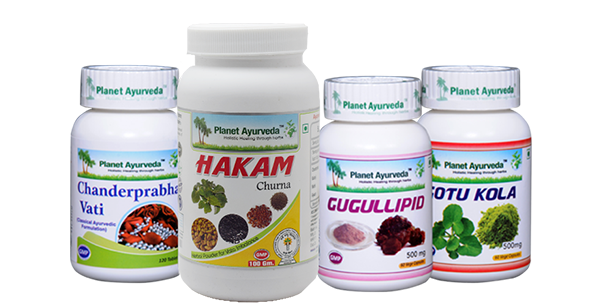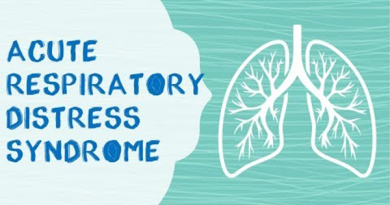How to Heal Thyroid Naturally with Ayurvedic Remedies
Abstract
Due to an increase in the use of sedentary lifestyle over the past couple of years, the prevalence rate of thyroid problems has been hiked up to great heights. The common ailments associated with this are hyperthyroidism and hypothyroidism. In the modern system of medicine symptomatic relief is given by oral medications or by surgery in advanced cases. But as Ayurveda focuses more on the preventive aspect by doing “nidan parivar jan chikitsa” (avoiding the root cause of disease) we can surely attain good results in such ailments. So let’s start discussing the major role Ayurveda plays in thyroid problems.

Introduction
Thyroid is an endocrine gland that appears like a butterfly in shape situated in the neck just below Adam’s apple. It secretes three important hormones in the blood circulation: triiodothyronine (T3), thyroxine/tetraiodothyronine (T4) and calcitonin. Both T3 and T4 hormones play a major role in maintaining metabolism of our body whereas calcitonin helps in calcium absorption within the body channels.
Thyroid disorders are of two types:
- Hypothyroidism– In this production of thyroid hormones got slowed down as a result of that the metabolism of our body also got hampered leading to increase in weight gain. A person suffering from hypothyroidism tends to suffer from obesity.
- Hyperthyroidism– In this there is an excess production of thyroid hormones, that leads to increase in body metabolism so it will increase the digestive power as well due to this patient will face the problem of weight loss.
Ayurvedic Overview of Thyroid Problems

Acharya charaka in charaka chikitsa sathan explains the topic of atiagani /bhasmak roga and it is correlated with hyperthyroidism as signs and symptoms of both the ailments resemble each other.
As per above shloka:
If a person has diminished kapha, aggravated pitta along with vayu , this will strengthen the digestive fire in its actual seat by its intrinsic heat. This intense pitta dosha along with associated other doshas, digest the food very forcibly, quickly and frequently due to its intensity. After digesting the food, it also start digesting the seven dhatus of our body [rasa (body fluid), rakta (blood), mansa (muscle tissue), med (adipose tissue and fat), asthi (bones), maja (bone marrow) and shukra (semen) resulting in general debility this is known as “atya agani/ bhasmak roga”.
Etiological Factors
These are the main causes (nidan as per Ayurveda) that results in formation of an ailment.
Causes of hyperthyroidism
- Graves disease- It is an autoimmune disease that results in elevation of thyroid hormone level.
- Thyroid adenoma
- Toxic multinodular goitre.
- Unhealthy dietary habits.
- Sedentary lifestyle.
According to Ayurveda:
Kashin kapha, pitta kupitam, marutanugama (decreased kapha dosha, elevated pitta dosha along with involvement of vata dosha) is the main etiological factor.
Causes of hypothyroidism:
- Underlying autoimmune disease
- Hereditary
- Deficiency of iodine intake
- Benign tumor of pituitary gland.
- Radiation therapy
Clinical Features
It means the general complaints of the patients.
Symptoms of Hyperthyroidism
- Weight loss in spite of increased appetite.
- Nervousness
- Tremors
- Loose stools
- Warm and moist skin
- Profuse sweating
- Fatigue
As per Ayurveda the below mentioned shloka explains the common complaints of hyperthyroidism and they are as follow:
- Trishna (polydipsia)
- Shawas (dyspnoea)
- Daha (burning sensation)
- Murcha (fainting)
- Sudha vridhi (excessive hunger)
- Balahani (loss of strength)
- Bhar hani (loss of body weight)
Symptoms of hypothyroidism
- Tiredness
- Inability to handle a cold environment as the body is extremely sensitive to cold.
- Constipation
- Weight gain
- Weakness in the muscles
- Body Aches
- Lethargic
- Depression
- Puffy face
- Thinning of hairs.
Diagnosis
- Through proper history taking.
- By detailed physical examination of the patient by using inspection, palpation, percussion and auscultation techniques.
Laboratory findings:
-
- Thyroid function test:
Condition T4 hormone TSH level Hyperthyroidism Increased Decreased Hypothyroidism Decreased Increased - Complete blood count.
- Thyroid function test:
According to Ayurveda:
The two most preferred diagnostic procedures used by a physician are as follow:
Management
As there is no definitive treatment to correct immune system dysfunctions. So our main focus is on correcting the clinical and biochemical abnormalities by symptomatic relief. It includes:
- Oral medication
- Radioactive iodine administration.
- In chronic cases subtotal thyroidectomy is indicated.
According to Ayurveda:
As per Ayurveda each and every malady arises due to an imbalance between the tridosha (three essential energies of our body vata, pitta and kapha) so our main focus is to establish an equilibrium between them. Particularly in thyroid problem vitiation of kapha and vata dosha is present, so the main line of treatment in this is as follow:
Sanshodhan Chikitsa (detoxification procedure)- This treatment modality is the most unique peculiarity of Ayurveda. It helps in detoxifying the blood channels, so that impurities of it will excrete out from the body that eventually helps in stabilizing the abnormality of different bodily hormones, and thyroid problems are also a hormonal imbalance related ailment.
- Deepan– In this the power of digestive fire (Agni) is increased by using deepan herbs such as saunf (fennel)
- Paachan– Digestive medicine is given by oral route to assimilate undigested food particles within the body.
- Sanehan– According to this smoothing the body doshas by using herbal ghrit/oil is done.
- Swedan– In this procedure the semi-hot medicated kwath (liquid medicine) is sprayed on the patient’s body by a specially made swedan yantra (instrument).
- Vaman (emesis) – emetic medicines are given to the patient to take out the vitiated dosha of the body.
- Virechana (purgation) is the best technique to release out the pitta dosha from the body by anal route.
- Raktamokshan (bloodletting) -It is considered as “ardh chikitsa” (important as a whole treatment) by acharya shushruta because it helps in purifying the blood by removing harmful toxins from it.
Beside these panchkarma modalities, herbal formulations of planet Ayurveda are also very generous and effective in action and works really well in thyroid problems.
Herbal Remedies of Planet Ayurveda in Thyroid Disorders
1. Hyperthyroid Care Pack
This pack contains 3 efficacious herbal formulations, as follow:
Products Description
1. Immune Booster
This herbal formulation is very effective in maintaining healthy functioning of the digestive system of our body as all the herbs present in it are great ‘pitta shamak’ (pitta dosha lowering property). It helps in clearing the impurities from blood channels and assists in increasing the immune power of our body so shows great results in hyperthyroidism. It is a potent blend of four herbs that includes grape seed (Vitis vinifera), cow colostrums (Bovine colostrums), bhumi amla (Phyllanthus niruri) and amalaki (Emblica officinalis).
Dosage: 2 capsules twice daily with plains water after meal.
2. Weight Gain Formula
It is an efficacious blend of herbs that possesses great rasayana property (rejuvenates the body channels). Herbs are enriched with bulk promoting action that helps in increasing body weight as it is the most common complaint of a patient with hyperthyroidism. Herbs present in this formulation are ashwagandha (Withania somnifera), haritaki (Terminalia chebula), vidang (Embelia ribes), pippali (Piper longum) etc.
Dosage: 2 capsules twice daily with plain water after meal.
3. Shatavari Capsules
This herbal capsule contains pure and standardized extract of shatavari (Asparagus racemosus). This herb is a very good natural antioxidant so helps in detoxifying the body. It helps in maintaining the normal functioning of hormones so assist very well in attaining normal thyroid level and aid in hyperthyroidism too.
Dosage: 2 capsules two times in a day with plain water..
2. Hypothyroid Care Pack
This herbal pack comprises of four herbal formulations as follows:

1. Gotu kola Capsules
This capsule contains pure and standardized extract of gotu kola herb (Centella asiatica). It is beneficial in attaining good physical strength and promotes longevity by its madhur vipak and sheet virya. It is a very good rejuvenating natural herb hence it improves activities of each organ. Being vyavasthapan and balya in action, it is used in general debility which a patient of hypothyroidism usually suffers.
Dosage : 2 capsules twice daily with plain water after meals.
2. Chanderprabha Vati
This herbal formulation helps in maintaining normal level of kapha and vata dosha due to the principle potency of herbs present in this formulation. It works very well in various disorders associated with these two dosha such as indigestion, general weakness and these two complaints are found profoundly in patients of hypothyroidism. It contains herbs such as guggul (commiphora mukul), haridra (curcuma longa), amalaki (Emblica officinalis) etc.
Dosage: 2 tablets twice daily with plain water after meals.
3. Guggulipid Capsules
This capsule contains a potent blend of guggul (Commiphora mukul) and resin. These two natural herbs help to regulate normal functioning of the immune system of our body as they have great anti inflammatory, antifungal properties. Along with that it also helps in clearing out toxins out of the body that helps in maintaining normal levels of thyroid and other hormones.
Dosage: 2 capsules twice daily with plain water after meals.
4. Hakam Churna
This powdered herbal formulation helps in regulating healthy body metabolism that helps in digestion of food we intake. As the patient of hypothyroidism generally suffers from constipation this herbal powder works really well for them. It contains natural herbs such as kalonji (Nigella sativa), chandrashoor ( Lepidium Sativum)etc.
Dosage: 1 tsp. twice daily with plain water after meal
Conclusion
Now we can conclude that Ayurveda deals with thyroid ailment by doing deep analysis of the signs and symptoms of the patient. The herbs present in our surroundings are packed with various health benefits and Ayurveda tells us about that in detail. For ayurvedic treatment you can consult planet Ayurveda, their herbal formulations are very effective in this regard as they are made under the guidance of Ayurveda experts. You can consult them by visiting their clinic at Mohali, Punjab or can send your queries on their email herbalremedies123@yahoo.com






